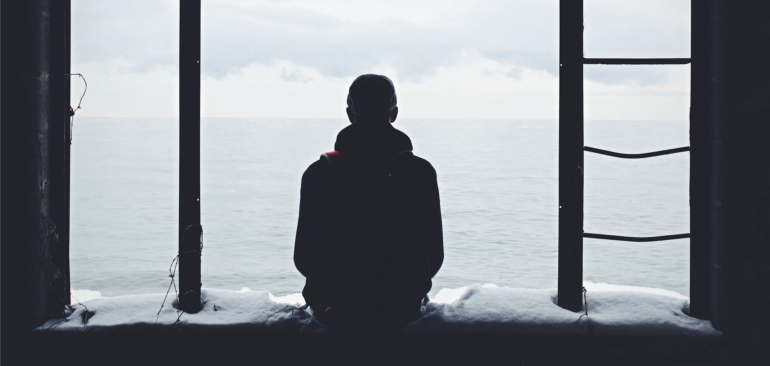
Isolation May Be “The New Normal,” But It Is Not Normal
Contrary to how some have described their somewhat suddenly isolated lives, I can’t possibly accept viewing the current reality as “the new normal.”
This is no kind of normal.
Recoiling when someone reaches to hand you something, steering your kids across the street to avoid the neighbors, making sure to let the mail sit for a day before daring to touch it – these things are not normal for humanity.
They are things we can handle, and we could fairly easily come to see it all as a new normal, because there’s logic to it. Observant Jews have particular experience with the logic of separation, because of the halachot at the center of our normal lives – for instance, when speaking of the concepts of “noten taam” (the idea that a non-kosher food can impart its “taste” to kosher foods or dishes, rendering them nonkosher). We are deeply aware that there are things which cannot be mixed, we understand that “mixture” and “contact” might be indirect to some degree, and we’re accustomed to analyzing definitions and drawing lines, determining what does and doesn’t count as contact. And now, we find ourselves speaking, completely reasonably, about whether the virus might leave its “taam” on the mail or other packages that come to our house. We assess which methods of “kashering” might work to cleanse our items from this “taam.”
This sort of analysis is present outside of observant Judaism too, of course – increasingly, as people navigate life with allergies and figure out where the lines are regarding cross-contamination. And the novel coronavirus is certainly not the first infection to be transmitted, or to require study of its transmission and proper precautions.
But when an email went out from my children’s school early on, notifying us that some students and faculty had been exposed to someone who then tested positive for Covid-19 and that they would therefore be expected to self-quarantine for 2 weeks, but that those who simply interacted with them and not directly with the patient wouldn’t – it was the halachic analogies that came to mind. “Exposure to exposure is not exposure,” said the email. Nat bar nat, I thought. A non-kosher item may transmit its “taste” once, but the recipient of that “taste” may not further transmit it to a third food or utensil.
That was weeks ago, though, and we’ve progressed from “exposure to exposure is not exposure” to wondering how much we should worry about potential viral “taste” on our mail, on the bottle of milk we managed to order online, on the clothing we wore for that essential outing. We’re reading up on the half-life of the virus on various surfaces, eager for experts to tell us at what point the chances of becoming sick from what’s left are so small as to be “batel” – nullified, like the tiniest drop of milk in a pot of chicken soup.
Over these last weeks, our collective sense of what makes sense has changed, as we’ve learned more and as the number of Covid-19 cases has grown. We’ve become more restrictive, tenser. I’ve taken to leaving my mail in the mailbox for at least 24 hours before opening it, and friends I’ve mentioned this to don’t seem to think that’s weird; they’re doing it too, because suddenly it makes sense. To some degree, it’s become a norm. But that doesn’t mean we should see it as normal – as the new way of being, from now on.
Observant Jews also have particular experience with temporary periods of increased vigilance, increased rules, increased separation and concern. After all, Pesach is coming, when we eradicate chametz from our possession so thoroughly that the regular rules of “batalah” (nullification) don’t apply. No chametz is okay; none at all. Total, complete isolation from chametz is the only way to go – but only when it comes to chametz, and only on Pesach.
It can feel a little funny, after Pesach, as we rush to finally indulge in pizza, bagels, or donuts – whatever local establishments might be able to provide immediately in a given community – like we have to get used to it being okay again. A little bit like walking in shoes after wearing roller skates, or walking on land after being on a boat for a while. We have to get our chametz legs back.
Likewise, I would guess that when this temporary situation ends and we return to real normal, we might need some time to get our social legs back. Other than walks around the block, I’ve gone out exactly twice in the past however many weeks it’s been, and it was oddly unnerving each time, because I’ve gotten oddly used to avoiding humans outside my nuclear family. We might need some time to get used to the experience of being back at work or school or stores, to remember what it’s like to have a conversation with someone closer than 6 feet, to literally reach out to others rather than recoiling when they reach out to us.
That’s one reason it’s so important to maintain awareness that the current situation is not a new normal, to remember that the warmth of in-person community is real and vital and will return to our lives, and we want it to.
Here, too, we can find an analogy in Pesach.
When Miriam leads the women of Israel in song after the splitting of the sea, the pasuk specifies that they didn’t just sing, but played instruments too. A midrash famously asks where they got the instruments, and explains that the women of the time were so certain they would be redeemed and have miracles to celebrate, that they packed instruments to be ready for it.
In the past, I saw that midrash as a lesson on having faith even in hard times. These days, I have a greater appreciation for a more fundamental layer: the fact that they cared about a redemption at all. That they didn’t simply accept their lives as they were, the lot of the nation as it had developed – their new normal, not even so new anymore after centuries – but believed a different existence was possible and wanted it and prepared for it.
Even during an extended period of difficulty, we can behave with certainty that it will end and that life will return to what it should be – because the current situation is not the way it should be.
So even while we’re in Coronavirus lockdown, we can remember that this is not the way life should be or always will be. There will be an end, and we can and should prepare for it now. We can make plans, even if we know they’re tentative. We can remind ourselves that “social distancing” is really only physical distancing, and look for ways to maintain social connections even from afar. (I never liked the phrase “social distancing” and have been gratified to see more and more people expressing the same point, slowly shifting to other terminologies.) And we can focus on balancing our weird new aversion to fellow humans with reminders – to ourselves and to those from whom we might recoil – that it’s not really about them, that we love and care for them, that we wish to be close and look forward to being so again soon.
A smile, a wave, and a kind word can go a long way – six feet at least – towards maintaining and even building those relationships, preparing for the day we can come out of our shells and get back to normal.
And with all the opportunities online – I can’t help thinking of a Jewish parallel there, too: the idea that God prepares the treatment before a problem even arrives. Having a robust worldwide web already in place has allowed for an explosion of resources through which we can continue to connect with each other, and hopefully will help us transition back to in-person interactions more smoothly than we’ve transitioned away from them.
Maybe we’ll come out of this with a heightened sense of hygiene and safety, like Pesach preparations might sensitize us to be a little more careful about keeping our meat and milk separate, or like kashrut observance in general has the potential to heighten awareness of cross-contamination when cooking for those with allergies. Maybe that’s not a bad thing.
But I hope we also come out of it with the deep sense that we went through some extreme, non-normal behavior for the sake of humanity as a whole. Because what’s normal is being in it all together.
One final note: As we contemplate the difficulties of our currently physically-distant lives, our foremost concern is of course for those suffering from the virus itself; that is, after all, why we’re doing this. And so I must end by voicing my prayers for a speedy recovery for all infected individuals, and for the world.
If you found this content meaningful and want to help further our mission through our Keter, Makom, and Tikun branches, please consider becoming a Change Maker today.







